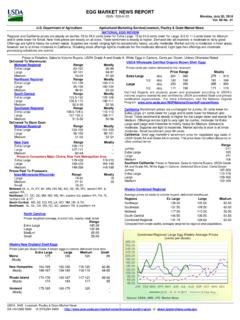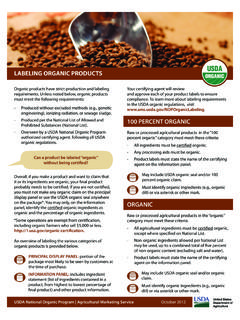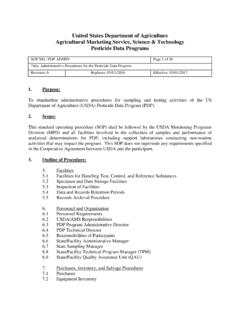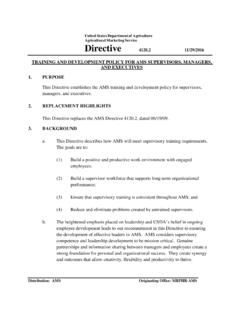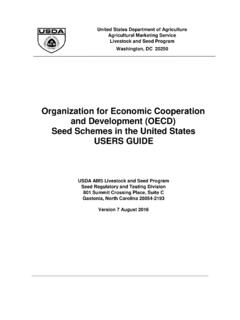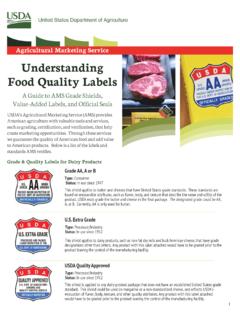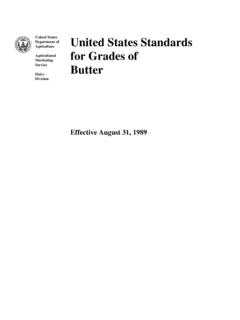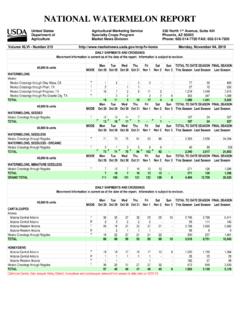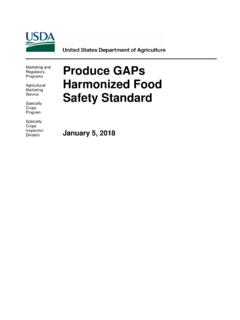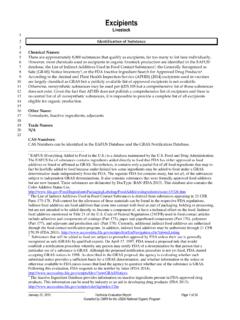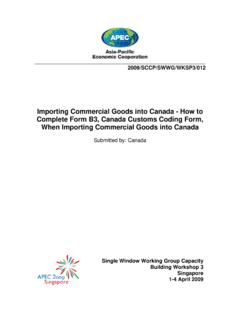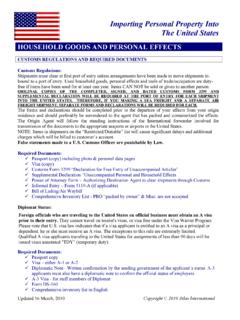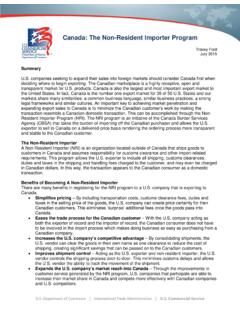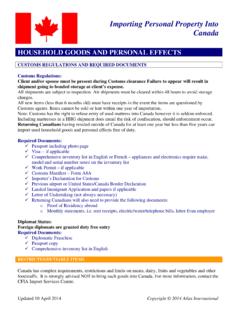Transcription of EXPORTING ORGANIC PRODUCTS FROM THE U.S.
1 National ORGANIC Program | Agricultural Marketing ServiceEXPORTING ORGANIC PRODUCTS FROM THE 2016 ORGANIC agriculture is a fast growing sector in agriculture, creating jobs, economic growth, and entrepreneurial opportunities. The National ORGANIC Program (NOP), part of USDA s Agricultural Marketing Service (AMS), establishes international ORGANIC import and export policies to facilitate trade and expand market opportunities for certified ORGANIC farms and businesses around the world. To create additional markets for certified ORGANIC farmers and businesses, USDA has facilitated trade partnerships with multiple foreign countries. Learn more about each partnership at: June 30, 2009: USDA ORGANIC PRODUCTS can be sold as ORGANIC in canada .
2 Terms of the Arrangement. To export ORGANIC PRODUCTS to canada , certified operations must: -Produce ORGANIC PRODUCTS without sodium nitrate or hydroponic/aeroponic methods. -Produce non-ruminant ORGANIC livestock according to Canadian stocking rates. -Ship ORGANIC PRODUCTS with documentation that attests, Certified in compliance with the terms of the US- canada ORGANIC Equivalency Arrangement. Labeling Requirements. ORGANIC PRODUCTS must comply with canada 's labeling requirements, including its dual language (English & French) requirement. For packaged retail PRODUCTS , labels or stickers must state the name of the USDA-accredited certifier and may display the USDA ORGANIC seal and/or the canada ORGANIC UNION (EU)Effective June 1, 2012: USDA ORGANIC PRODUCTS can be sold as ORGANIC in the EU.
3 PRODUCTS must be either produced or have had final processing or packaging occur in the of the Arrangement. To export PRODUCTS to European Union member countries, certified operations must: -Meet additional specifications for wine. -Ship ORGANIC PRODUCTS with an EU certificate of inspection, completed by a USDA-accredited Requirements. Traded PRODUCTS must comply with EU labeling requirements. For packaged retail PRODUCTS , labels or stickers must identify the certifier code for the USDA-accredited certifier and may display the USDA ORGANIC seal and/or the EU ORGANIC January 1, 2014: USDA ORGANIC plants, mushrooms, and plant-based processed PRODUCTS (such as grape juice or corn meal) can be sold as ORGANIC in Japan.
4 PRODUCTS must be either produced or have had final processing or packaging occur in the of the Arrangement. To export plants, mushrooms, and plant-based PRODUCTS to Japan, certified operations must: -Ship PRODUCTS with an export certificate (TM-11), completed by a USDA-accredited certifier. Certifying agents must be on the approved list to issue the Requirements. Traded PRODUCTS must meet Japan's ORGANIC labeling requirements. For packaged retail PRODUCTS , labels or stickers must state the name of the USDA-accredited certifier and may display the USDA ORGANIC seal. The Japanese ORGANIC logo is required on plant and plant based PRODUCTS . A Japanese Agricultural Standards (JAS)-certified importer must apply the seal, unless the certified USDA ORGANIC operation has a JAS-labeling contract with a JAS-certified importer.
5 Other PRODUCTS . ORGANIC PRODUCTS not regulated by the JAS law such as meat, dairy PRODUCTS , and alcoholic beverages may also be exported to Japan. These USDA ORGANIC certified PRODUCTS do not require an export certificate and may be labeled with the USDA ORGANIC seal, but may not display the Japanese ORGANIC OF KOREAE ffective June 1, 2014: Processed food PRODUCTS certified to the USDA ORGANIC regulations can be sold as ORGANIC in Korea. PRODUCTS must have had final processing occur in the of the Arrangement. To export PRODUCTS to the Republic of Korea, certified operations must: -Produce processed food PRODUCTS as defined by the Korean Food Code (see ).
6 -Produce PRODUCTS with at least 95 percent ORGANIC ingredients. -Ship exports with documentation that states, Certified in compliance with the terms of the US-Korea ORGANIC Equivalency Arrangement. operations must inform a USDA-accredited certifying agent that they wish to ship PRODUCTS to Korea, and ship exports with an NAQS import certificate, completed by that certifying PRODUCTS . Non-processed agricultural PRODUCTS need to be certified directly by a Ministry of Agriculture, Food and Rural Affairs (MAFRA)-accredited Requirements. Traded PRODUCTS must comply with Korea's ORGANIC labeling requirements and may display the USDA ORGANIC seal and/or the MAFRA ORGANIC July 10, 2015: PRODUCTS certified to the USDA ORGANIC regulations can be sold as ORGANIC in Switzerland.
7 PRODUCTS must be either produced or have had final processing or packaging occur in the of the Arrangement. To export PRODUCTS under the partnership, certified operations must: -Produce and label ORGANIC wine to the regulations of the importing country. -Ship PRODUCTS with a Swiss import certificate (see forms tab), completed by a USDA-accredited certifying Requirements. Traded PRODUCTS must follow Swiss ORGANIC labeling requirements (see Legal Basis tab at the bottom of the page) and may display the USDA ORGANIC seal. The Swiss Government does not administer an ORGANIC March 18, 2009: USDA ORGANIC PRODUCTS produced in the or its territories can be sold as ORGANIC in Taiwan.
8 Terms of the Arrangement. To export PRODUCTS under the partnership, certified operations must: -Ship PRODUCTS with a TM-11 export certificate completed by a USDA-accredited certifier. Certifying agents must be on the approved list to issue the TM-11. -Ship livestock and meat PRODUCTS with documentation that states: ORGANIC livestock PRODUCTS , accompanied by this certificate, were managed and produced without the use of systemic pain killers or analgesics, including the use of Lidocaine or Procaine. -Ship processed PRODUCTS and crops with documentation that states: " ORGANIC agricultural PRODUCTS and ORGANIC processed PRODUCTS , accompanied by this certificate, were produced or processed using zero prohibited substances.
9 "Labeling Requirements. For packaged retail PRODUCTS , labels or stickers must state the name of the USDA-accredited certifier and may use the USDA ORGANIC seal. OTHER INTERNATIONAL MARKETSMany other countries accept USDA ORGANIC PRODUCTS without a specific trade partnership. REQUIREMENTSIn addition to ORGANIC requirements, traded agricultural PRODUCTS must meet all general or commodity-specific import requirements for the destination country. Labeling. Generally, PRODUCTS must meet labeling requirements in the destination country. Export Codes. For certain ORGANIC PRODUCTS , traders must use harmonized tariff schedule codes for tracking purposes.
10 Exported agricultural commodities must often meet product size, grade, quality, and maturity requirements. Safety. Most countries require shipments to include specific permits and certificates to ensure the product is healthy and free from pests requiring quarantine. Such requirements vary by country. IDENTIFYING ORGANIC PRODUCTSIf an ORGANIC logo (see below) isn t on the exterior of the shipping box, shippers should review the: -Document ( bill of lading) detailing sales of ORGANIC goods and specifying terms of delivery. -Commercial invoice representing a complete record of the business transaction. -Any import/export certificate or attestations, as required (see above).
